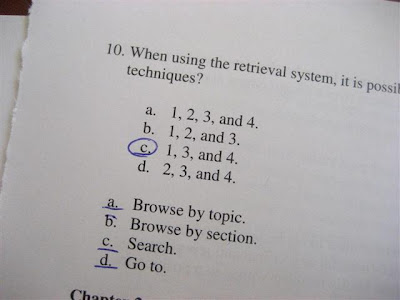Popular advice about taking multiple-choice tests is to stick with your first response because, you're more likely to switch from a correct response to an incorrect one. However, many decades of research seem to suggest otherwise.
Commentary
A study on strategies for multiple choice tests posed the following question to students and teachers:
When taking multiple-choice tests, it is sometimes the case that one answer seems correct at first, but upon further reflection another answer seems correct. As a general rule is it better to stick with your initial "first instinct" - or to change your answer if another choice seems better? In other words, which answer is probably more likely to be correct?Many students and teachers thought that the first answer you choose is more likely to be correct. Yet, the reality is quite different. Here is an excerpt of the study's results regarding changed answers:
- 51% - wrong to right,
- 25% - right to wrong, and
- 23% - wrong to wrong
The study goes on to show that the reason so many people think that sticking with your first answer is better is because of excessive counterfactual thinking. That is, when you change answer from a correct response to an incorrect one, you are more likely to think "if only I hadn't..." which is easier to recall in the future.
See Also
- Counterfactual Thinking and the First Instinct Fallacy for the full text of the study.


3 comments:
Spell check "counterfactual" in the mid-paragraph link.
@Victoria: Fixed, thanks.
That makes a certain amount of sense, but without having read the studies, my initial reaction is that it is somewhat context specific. Ie, perhaps in the majority of situations where you are "guessing", you have some basis for your guess and would be better off sticking off with your first answer. However, my gut feeling is that in instances where you really have no idea why you're making a specific choice other than that it "feels right", that you would be better off sticking with your original answer. Granted, switching from right to wrong was virtually the same statistically as switching from wrong to wrong, but I would be very interested to see something that looked at how the people made their initial decisions, as well.
Post a Comment
In addition to comments, please indicate any typographical errors or issues related to this post.
Or you can contact me in private.
Note: Only a member of this blog may post a comment.